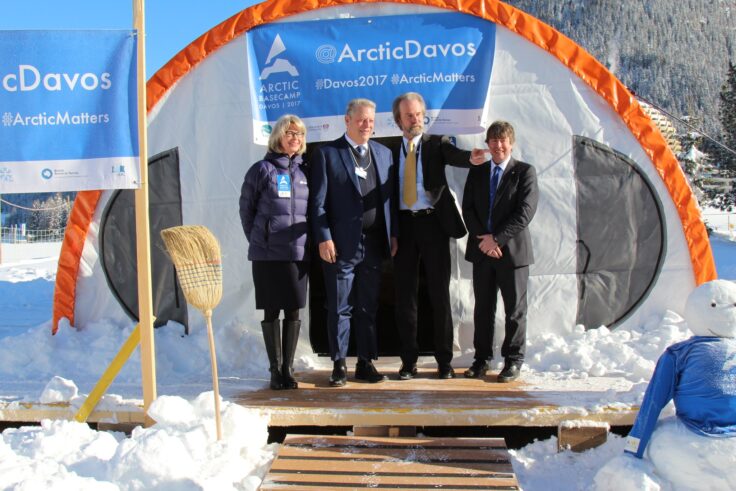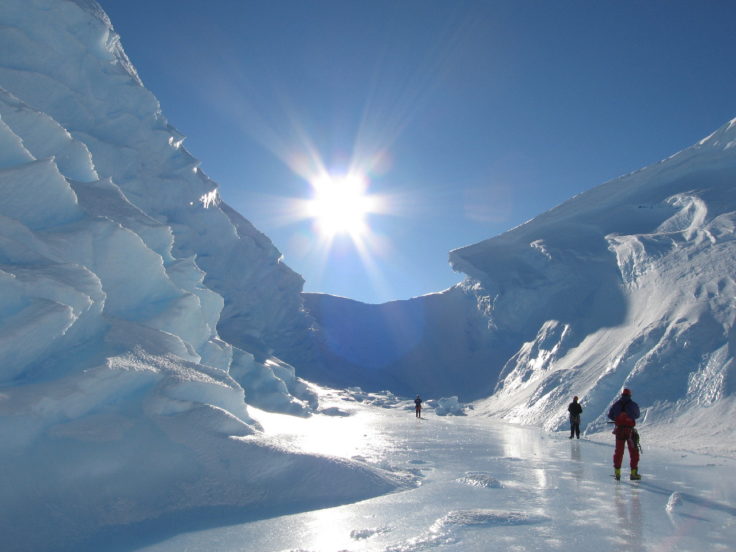Leading scientists gather at Davos today (18 January), with Al Gore and Christiana Figueres, for an urgent meeting on Arctic change. Growing concern prompts ‘Arctic Basecamp’ at World Economic Forum Annual Meeting calling for responsible and responsive leadership on Arctic change. Eminent scientists, government representatives and business leaders will come together to discuss and address the complex challenges Arctic change presents to the world.

Their message to the Davos delegation, the world’s most powerful global audience, is to convey that ongoing temperature changes in the Arctic have serious socio-economic effects in the rest of the world. They offer their expertise to help political and business leaders shape the international agenda in order to address these effects.
They will present the latest findings on Arctic science and call for the mobilisation of an international response team.
Christiana Figueres, former Executive Secretary of the United Nations Framework Convention on Climate Change says:
“We’re seeing signs from the Arctic that climate-change is progressing extremely quickly, even with just 1 degree of warming. Such incontrovertible evidence of our planet’s distress cannot be ignored and the impacts to the global economy, to food production and civil stability are growing. However, a climate-safe world, where nature thrives and opportunities for all are abundant is still within our line of sight. Actions to arrest global warming pollution are increasing at great pace all around the world. The shift to a low-carbon economy is now unstoppable, but can it be done in a timely fashion?
“We are all united in wanting a safe, stable environment with long-term jobs that serve the economy of tomorrow. Let us harness that collective consciousness and use it to raise ambition, increase the speed and scale of the transition and deliver a turning point in greenhouse gas emissions by 2020.”
The event is organised by Lancaster University, British Antarctic Survey (BAS) and WSL, Institute of Snow and Avalanche Research SFL.
Lancaster University and BAS are members of the ICE-ARC, (Ice, Climate, and Economics – Arctic Research on Change), project funded by the European Union’s 7th Framework Programme. ICE ARC examines the current and future changes in Arctic sea ice – both from changing atmospheric and oceanic conditions and the consequences of these changes both on the economics of the area, and social aspects such as on indigenous peoples. The Swiss Federal Institute for Forest Snow and Landscape Research WSL is a founding member of the Swiss Polar Institute.

Organiser and speaker Gail Whiteman from Lancaster University says:
“We know that science has important answers in assessing the global risks associated with the Arctic change and we need to make this as visible as possible in Davos. Arctic change is at a critical juncture; hard choices need to be made. These must be evidence-based and not ideologically driven. Ultimately we want to see a new Global Platform for Arctic Action, and it starts here with this summit.”
Organiser and Arctic sea ice expert Jeremy Wilkinson from British Antarctic Survey says:
“It’s fantastic that Arctic issues are on the political and business agenda as they are very relevant to society. Scientists must build meaningful relationships with policy makers, business leaders, economists, and the peoples of the Arctic in order to provide access to the latest research studies which can then underpin decision making.”
Director of WSL, Professor ETH, Konrad Steffen, Swiss Federal Institute for Forest, Snow & Landscape Research WSL:
“The Polar Regions, as well as Alpine regions, will experience two to three times the mean level of global warming predicted for the future. We need to act swiftly to delay, or prevent, the loss of the ice masses in the mountains and the shrinking of the two polar ice sheets which will lead to unsustainable sea level rises.”
Ten leading Arctic experts will participate in the event and be camping at the specially built Arctic Basecamp at Davos, in the grounds of the WSL Institute for Snow and Avalanche Research SLF.
A series of panel discussions and presentations will illustrate the current changes in the Arctic due to warming:
- Climate change in the Arctic is unequivocal
- Long-term measurements clearly demonstrate that the Arctic is warming at a rate over twice the global average
- The legally binding Paris Agreement states global temperatures should not exceed the 2 °C limit compared to preindustrial times. 2 °C globally would mean 5 °C or more temperature increase across the Arctic
- Extreme events are becoming more common; in some regions of the Arctic, the temperatures over Christmas were around 20 °C above what is expected for this time of the year.
For press enquiries, including interview and filming requests, and the opportunity to visit Base Camp please contact:
Helen Merrills
Helen.merrills@communicationsmanagement.co.uk
+44 (0) 7795 838870
Swiss Federal Institute for Forest Snow and Landscape Research WSL
Research for People and the environment“: WSL monitors and studies forest, landscapes, biodiversity, natural hazards and snow and ice. WSL is a research institute of the Swiss Confederation and part of the ETH Domain. The WSL Institute for Snow and Avalanche Research SLF is part of WSL since 1989. WSL is a founding member of the Swiss Polar Institute. For more information visit: www.wsl.ch
WSL Institute for Snow and Avalanche Research SLF
The WSL Institute for Snow and Avalanche Research SLF is part of the Swiss Federal Research Institute WSL and thus belongs to the ETH Domain. It engages in research and scientific services with focus on snow, avalanches, other alpine natural hazards, permafrost and mountain ecosystems. Its best-known service is the avalanche bulletin for Switzerland. For more information visit: www.slf.ch
ICE-ARC (Ice, Climate, Economics – Arctic Research on Change) is a programme funded by the European Union’s 7th Framework Programme (ECGA 603887). It is a 4 year project that started on the 1st January 2014, and looks into the current and future changes in Arctic sea ice – both from changing atmospheric and oceanic conditions. We are also investigating, in a robust way, the consequences of these changes both on the economics of the area, and social aspects such as on indigenous peoples. www.ice-arc.eu
